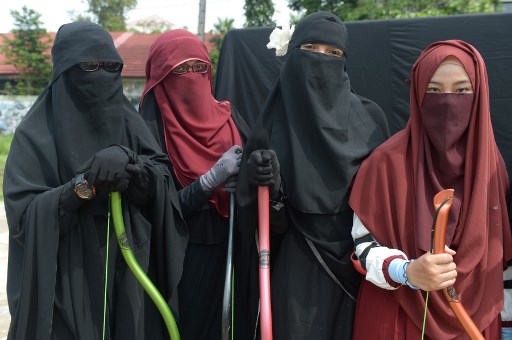One of the details noted by witnesses of the suicide bombing on Sunday at the Gereja Kristian Indonesia (GKI) Church in Surabaya, committed by a woman named Puji Astuti who killed herself as well as her daughters (aged 9 and 12) during the attack, is that the perpetrator and the children were wearing cadar (face veils) that concealed their identities before the attack.
Given that, and the current climate of fear in Indonesia following the horrific bombing of GKI and three other targets in Surabaya, the country’s minister of religious affairs, Lukman Hakim Saifudi, said that women wearing the cadar or niqab (another term for the face veil used in conjunction with head covering) must understand that there will be some people who are anxious or suspicious towards them. He urged them to act in a way that made people feel safe around them or at least not attracted attention.
But he also urged the rest of the general public to not feel worried or suspicious towards those who wear the face veil for religious reasons.
“Therefore, we should respect our sisters who use the veil, for it is their right to exercise the understanding of religion that they believe in,” Lukman said yesterday as quoted by Detik.
It should be noted that the neighbors of the family behind the church bombings said that Puji Astuti did not actually wear a cadar in daily life, just a hijab (headscarf).
Although use of the hijab in Indonesia is widespread, the number of women using the cadar or niqab is relatively tiny, though there is evidence it is becoming more mainstream. A group calling themselves the “Niqab Squad” has formed chapters in cities across Indonesia to help support women who wear the veil and fight public perceptions that they “dress like terrorists”.
In March, two Islamic universities in Indonesia banned the use of niqab among students and faculty due to fears of growing fundamentalism on campus, but both ended up reversing their stances after being widely criticized for impinging on religious freedoms.




